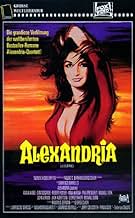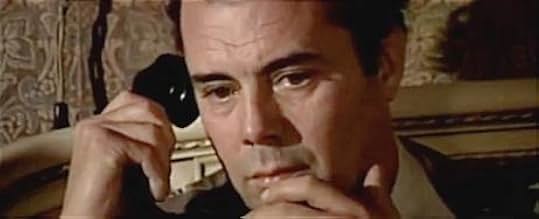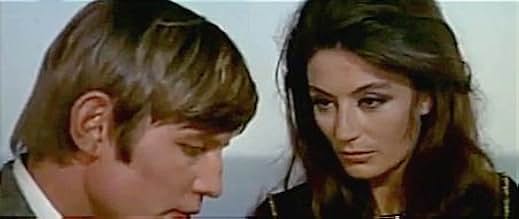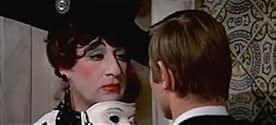In British Palestine of 1938, several men vie for the affections of a Coptic banker's wife who's involved with the anti-British underground movement.In British Palestine of 1938, several men vie for the affections of a Coptic banker's wife who's involved with the anti-British underground movement.In British Palestine of 1938, several men vie for the affections of a Coptic banker's wife who's involved with the anti-British underground movement.
- Directors
- Writers
- Stars
- Awards
- 2 nominations total
- Directors
- Writers
- All cast & crew
- Production, box office & more at IMDbPro
Featured reviews
A condensed version of Lawrence Durrell's brilliant literary classic Alexandria Quartet, Justine is about the sophisticated game of international intrigue and espionage in Alexandria, Egypt (at the time the Switzerland of Africa and the Middle East) between the first and second world war. Subtle character portraits from a range of British and European actors at the top of their game draws the viewer into a fascinating foreshadowing of the political events to come.
In 1938 Alexandria, a British schoolmaster (Michael York) befriends the wife of a banker named Justine (Anouk Aimee), a mysterious woman whom he meets through a British officer (Dirk Bogarde). She's actually a prostitute and political activist.
Darley, the York character, finds out that Justine is heavily involved with an anti-British plot to give arms to the Jewish underground in Palestine.
This uneven film is based on Lawrence Durrell's collection, "The Alexandria Quartet." The film is pretty unsuccessful, though there are still signs of director Cukor's hands - he took over from the original director. The film seems like it starts in the middle. Nice photography, good music, but it doesn't hang together. Michael York, Dirk Bogarde, and John Vernon are all good; Aimee does okay. Apparently she and Cukor didn't get along. She gives a somewhat confusing performance.
Can't really recommend it.
Darley, the York character, finds out that Justine is heavily involved with an anti-British plot to give arms to the Jewish underground in Palestine.
This uneven film is based on Lawrence Durrell's collection, "The Alexandria Quartet." The film is pretty unsuccessful, though there are still signs of director Cukor's hands - he took over from the original director. The film seems like it starts in the middle. Nice photography, good music, but it doesn't hang together. Michael York, Dirk Bogarde, and John Vernon are all good; Aimee does okay. Apparently she and Cukor didn't get along. She gives a somewhat confusing performance.
Can't really recommend it.
Despite its occasional passages of purple prose and its labyrinthine plot Lawrence Durrell's 'Alexandria Quartet' has never ceased to cast its spell and is rightly considered one of the finest works of the twentieth century. I would however venture to say that it belongs to a select group of literary works including Joyce's 'Ulysses' and Heller's 'Catch 22' which are frankly unfilmable.
Director Joseph Strick had previously had a go at 'Ulysses' and was hired to direct 'Justine' which is the title of the first part of Durrell's tetralogy. By all accounts his crackpot notion of casting Glenda Jackson(!) in the title role got him the old heave-ho. In came George Cukor. A safe pair of hands one would think? Think again!
The resulting film is an absolute mess and an unmitigated disaster from which the paying public stayed away in droves. The appeal of Durrell's novel lies in the setting of which he had first hand knowledge when working there for the British government and in the fascinating, complex characters he has created. In fact his second wife, a Jewish Alexandrian, was the inspiration for the character of Justine. Sadly, even with Leon Shamroy behind the camera the film is utterly devoid of atmosphere whilst Anouk Aimee, in attempting to be enigmatic as Justine, is just plain lifeless. Michael York as Darley takes blandness to a new level. Philippe Noiret as Pombal is a caricature and Dirk Bogarde as Pursewarden turns in another of his 'tortured soul' performances. Anna Karina is totally miscast as Melissa. Best to draw a discreet veil over Jack Albertson as Cohen. The only actors who emerge relatively unscathed are John Vernon as Nessim and George Baker as Mountolive. There is some distinctly dodgy dubbing going on here and one has a sneaking suspicion that the atrocious editing is due to severe post-production snipping. Cukor himself was reticent regarding this which of course speaks volumes.
One dreads to think what Mr. Durrell thought of this monstrosity and he deserved a profound apology. Apparently he much admired Henry Miller's novel 'Tropic of Cancer', yet another 'unfilmable' that was released in 1970 and directed by..........Joseph Strick! You couldn't make it up.
Director Joseph Strick had previously had a go at 'Ulysses' and was hired to direct 'Justine' which is the title of the first part of Durrell's tetralogy. By all accounts his crackpot notion of casting Glenda Jackson(!) in the title role got him the old heave-ho. In came George Cukor. A safe pair of hands one would think? Think again!
The resulting film is an absolute mess and an unmitigated disaster from which the paying public stayed away in droves. The appeal of Durrell's novel lies in the setting of which he had first hand knowledge when working there for the British government and in the fascinating, complex characters he has created. In fact his second wife, a Jewish Alexandrian, was the inspiration for the character of Justine. Sadly, even with Leon Shamroy behind the camera the film is utterly devoid of atmosphere whilst Anouk Aimee, in attempting to be enigmatic as Justine, is just plain lifeless. Michael York as Darley takes blandness to a new level. Philippe Noiret as Pombal is a caricature and Dirk Bogarde as Pursewarden turns in another of his 'tortured soul' performances. Anna Karina is totally miscast as Melissa. Best to draw a discreet veil over Jack Albertson as Cohen. The only actors who emerge relatively unscathed are John Vernon as Nessim and George Baker as Mountolive. There is some distinctly dodgy dubbing going on here and one has a sneaking suspicion that the atrocious editing is due to severe post-production snipping. Cukor himself was reticent regarding this which of course speaks volumes.
One dreads to think what Mr. Durrell thought of this monstrosity and he deserved a profound apology. Apparently he much admired Henry Miller's novel 'Tropic of Cancer', yet another 'unfilmable' that was released in 1970 and directed by..........Joseph Strick! You couldn't make it up.
10matt-201
George Cukor's adaptation of Lawrence Durrell's ALEXANDRIA QUARTET forms the shape of a dial made of character traits from medieval mystery plays--Fanatic Patriotism, Sexual Cunning, Heartless Bargaining, Furtive Retreat. If Durrell sought to catalogue every human impulse, Cukor had another, lower agenda that serves the material beautifully: shifting these allegorical characters into ripe, lustrous kitsch icons who seem to have time-travelled from a Sternberg movie circa 1931.
The whole picture seems to have undergone a time-machine move from THE SHANGHAI GESTURE to swinging '69. It's Cukor's most vibrant movie visually, and each gorgeously staged and color-patterned shot finds a new way to layer an Islamic tapestry atop psychedelic poster art.
Cukor, brought in as a replacement, brings a vigor to the material you don't associate with him, and at 70, he still knew how to shape the beats of a scene like a Broadway pro. It is reported that he and the star, Anouk Aimee, loathed one another, and in honesty it's easy to see Cukor's frustration: she gives a dismally coy, incommunicative performance as the black widow whose web forms the story. She seems aberrantly at odds with the coolly dignified, taciturn style of the other performances: Dirk Bogarde, as the Graham Greene-ish diplomat with a lurid secret may never have been more creepily sympathetic than he is here. And John Vernon, an actor best known for playing pompous authoritarians in B movies, has such noble composure as Justine's long-suffering husband that he seems to turn into a folk-art engraving of a noble and besieged human soul.
The whole picture seems to have undergone a time-machine move from THE SHANGHAI GESTURE to swinging '69. It's Cukor's most vibrant movie visually, and each gorgeously staged and color-patterned shot finds a new way to layer an Islamic tapestry atop psychedelic poster art.
Cukor, brought in as a replacement, brings a vigor to the material you don't associate with him, and at 70, he still knew how to shape the beats of a scene like a Broadway pro. It is reported that he and the star, Anouk Aimee, loathed one another, and in honesty it's easy to see Cukor's frustration: she gives a dismally coy, incommunicative performance as the black widow whose web forms the story. She seems aberrantly at odds with the coolly dignified, taciturn style of the other performances: Dirk Bogarde, as the Graham Greene-ish diplomat with a lurid secret may never have been more creepily sympathetic than he is here. And John Vernon, an actor best known for playing pompous authoritarians in B movies, has such noble composure as Justine's long-suffering husband that he seems to turn into a folk-art engraving of a noble and besieged human soul.
With very little exposition, we are unceremoniously plunked down into this muddle of a tale set on the coast of the Mediterranean sea in Alexandria, just north of Egypt. Michael York stars as a schoolteacher and writer in the 1930s who is returning to Alexandria on a "fool's journey", having an affair with a belly dancer but just as quickly dumping her for a tempestuous politico named Justine, a married prostitute (and former Jew!) who is panicked by the British takeover of the Muslims. Adapted from Lawrence Durrell's celebrated collection "The Alexandria Quartet", this indifferent, wayward drama shows no signs of a decisive captain of the ship. Filmmaker George Cukor (of all people) took over after the first director was fired; how much of the original work remains is unknown--but, no matter, the whole misbegotten venture is terrible from start to finish. York (who also narrates, seemingly under duress) approaches every scene with the same expression: a quizzical blank. Anouk Aimée teases him by licking crumbs from his lips and dashing into the ocean naked, but when York gets physical, she freezes up like a Hollywood heroine from the 1950s and tells him, "Don't!" Leon Shamroy's cinematography is fine, Jerry Goldsmith's music is lively, and John Vernon is surprisingly cordial and handsome as Justine's husband. All the rest is cinematic cabbage. *1/2 from ****
Did you know
- TriviaJoseph L. Mankiewicz was working on the screenplay when he was approached to take over Cleopatra (1963) in 1961.
- GoofsA little more than an hour into the film, Dirk Bogarde's character is kissed on the neck by a heavily made-up prostitute in his room. He turns to the camera and his neck is clean. Shortly afterward, Bogarde looks in a mirror and he has a prominent red lipstick kiss on his cheek, though he was never kissed there.
- ConnectionsFeatured in Sex at 24 Frames Per Second (2003)
- How long is Justine?Powered by Alexa
Details
Box office
- Budget
- $7,870,000 (estimated)
- Runtime
- 1h 56m(116 min)
- Aspect ratio
- 2.35 : 1
Contribute to this page
Suggest an edit or add missing content


































